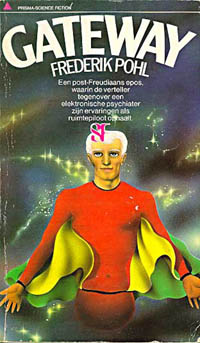

This provided the inspiration for the material so ruthlessly satirised in The Space Merchants. Afterwards, he became a literary agent, then went into advertising. Pohl joined up in 1943, serving in the US Army Air Forces in Italy and France. To make ends meet, he ended up writing much of the material himself. Each title had a monthly budget of $405 and printed 45,000 words. By the time he was 20 he had become an editor himself, working for the vast Popular Publications chain: they published 60 pulp-fiction magazines a month, half of them westerns, and only two of them science fiction: Astonishing Stories and Super Science Stories, both edited by Pohl.


Most of his early sales were collaborations, while his solo efforts appeared under pseudonyms. Pohl began selling his work while still a teenager. They included Isaac Asimov, Damon Knight, Donald A Wollheim and James Blish.

"Once or twice we lived nowhere at all." He began reading SF pulp magazines when he was an adolescent and soon made contact with the Futurians, a small group of New York SF fans many of whom went on to become recognised as science-fiction professionals. "Sometimes we lived in luxury hotels," Pohl wrote. He also published more than 20 collections of short stories and one of the best and most revealing autobiographies by any of the writers of his period: The Way the Future Was (1978).Īn only child, born in Brooklyn, Fred spent much of his childhood travelling: within weeks of his birth his parents had moved from New York to Panama in search of work, the first of many relocations as their family fortunes changed. He continued writing until the last years of his life: his most recent novel, All the Lives He Led, came out in 2011. In 1979, Pohl's novel Jem won the National Book award, one of the highest literary awards in the US. Five more Heechee novels were to follow, developing the idea in unexpected and imaginative ways. Using an ingenious narrative voice, the novel describes the exploration of the galaxy by use of unpredictable and often dangerous technology that had been abandoned millennia before by a vanished civilisation (the Heechee). Full of ideas and formal experiment, it still represents an artistic and intellectual highpoint in the science fiction of that era. A year later came the first of his "Heechee" novels, Gateway (1977), a remarkable work, the winner of most of the main SF awards in its year. In his late 50s he produced Man Plus (1976), winner of the coveted Nebula award. However, the novels Pohl wrote in his maturity as sole author are probably his lasting legacy.


 0 kommentar(er)
0 kommentar(er)
